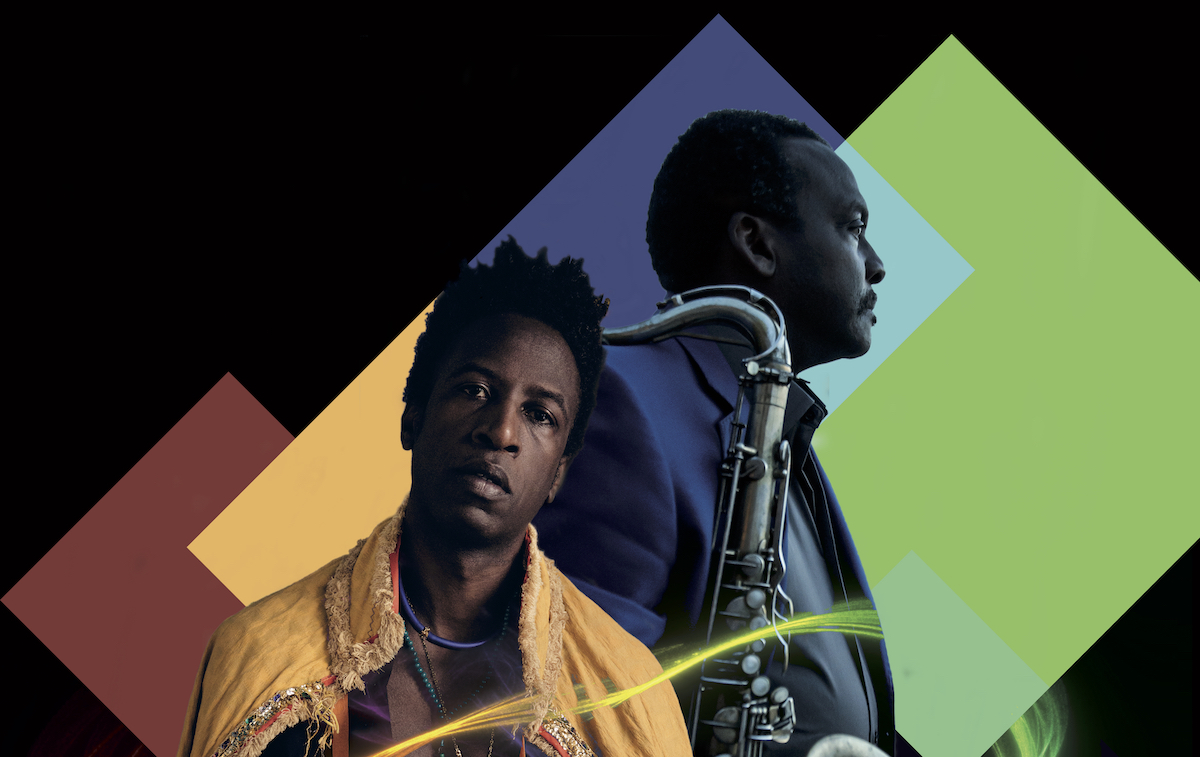With the passing of great individuals comes an inevitable sadness, but also the opportunity to celebrate the life of the deceased, forging new creative relationships in the process. Saul Williams and David Murray met at the funeral of writer, poet and activist Amiri Baraka, with whom Murray had worked in a musical capacity during the early eighties and Williams, sharing a stage multiple times. So impressed was Murray by the poetry that Williams recited at the service, the veteran saxophonist immediately reached out to propose a collaboration, beginning a new chapter in his 40-year-long recording career.
Their serendipitous connection wasn’t immediately apparent to Williams, the rap artist and poet whose appreciation of Baraka’s work had initially centred around his writing and theatre production.
‘I had the honor of sharing the stage with Amiri Baraka many times,’ Saul explains, ‘and studied his writing on music as much as the music in his writing and the musicality of his delivery. He taught me how to hear music and a great deal about theater as well. His play The Dutchman changed my life when I first encountered it. But in fact, I had never studied his recordings. Once I did, I was blown away and yes, David Murray was right there.’
It was after his and Murray’s initial conversation that Williams began to explore Murray and Baraka’s recordings, which include 1982 album New Music – New Poetry and the track Wailers, included on the Giorno Poetry Systems compilation, Life Is A Killer. ‘It was mind-blowing.’ he simply states.
But Amiri Baraka wasn’t their only mutual friend. Each had also built a relationship with Turkish jazz impresario Mehmet “Memo” Uluğ. Williams had met Memo in the late nineties, while ‘traveling with Ilhan Ersahin and Wax Poetic.’ Memo and his brother were Saul’s hosts during the trip and like the city of Istanbul, figure deeply into Saul’s memory of those encounters. Murray had also formed a relationship with Memo, playing shows in Istanbul, where he had significantly influenced the jazz scene by promoting concerts and opening the club, Babylon.
After Mehmet’s passing, Murray channelled the emotions it stirred into a suite, titled in tribute to him. From that suite, came Blues for Memo, the studio record that underpins Murray and Williams’ collaboration.
‘What I’ve learned in this project and projects before with great poets, is that the word is ever so powerful’ Murray states. ‘With Saul, we’ve had the opportunity to grow.’ The music we hear from Murray and his quartet on Blues for Memo developed during a three-week touring period, preceding the recording sessions. Saul’s poetry and the compositions became open to improvisation – something which was key to the recording process and has been equally important in their subsequent shows.
‘The music and the poetry become improvisation,’ David explains, ‘parts of the songs change, certain elements, certain vamps [chord progressions or rhythmic ideas that begin and end pieces] might go on longer and other ideas might come into Saul’s head.’ David likens Saul’s stagecraft to that of a comedian – allowing the liveliness of the audience as well as new creative or topical ideas to inform his delivery, night by night.
Saul has relished the collaboration just as David’s quartet have, learning new things in a region of music different to that of his own musical originals. ‘David Murray’s playing is a whirlwind of spirit.’ Saul states. ‘He surrounds himself with the energy all master band-leaders aim to arrange around them: Jaribu Shahid on bass, Orrin Evans on piano, Nasheet Waits on drums. I don’t have no problems on stage. Each one of these dudes is a traveler. I stretch in my spacing and exploration while actually watching the magic happen. I understand my freedom. Even if it falls under a regiment of genre. Even if it’s just a bunch of male energy, swirling. It’s harmless in its vulnerability, which is more than I can say for all the bullshit that isn’t music.’
Strong bonds have formed between the musicians involved in this project. Murray’s quartet contains players whose relationship with their bandleader go back a long way, but none longer than drummer Nasheet Waits. ‘I’ll be travelling with the best drummer — I think — in jazz’ Murray proudly states. “I met him when he was seven, when I was working with his father, Freddie “Dawud” Waits. This was during a period when we were at the height of the World Saxophone Quartet and I remember his son was very close to him — and his little brother — they were right there where they grew up at this artist place down on the West Side [of New York]. I remember him [Nasheet] helping us out, doing everything that his father said. You could see he would be bright at whatever he did, I don’t know if he was even playing drums yet. but he was just a bright kid. He’s an accomplished adult now! He’s a very good friend, I tell him to stop calling me Mr. Murray but he says, ‘I can’t help it!’”
Saul feels similarly deep connections through the project, but his divert his thoughts back to his own family. ‘I stand up there and think about my father. David kinda looks like him. So I’m collaborating with the idea of being a son, a part of some lineage, yet truly I’m just up there to make my mother proud. She loves jazz. I feel at home in it, even though its rawness and shape sometimes scares the shit out of me. I mean, sometimes I miss the 808s, but this collaboration is performance-based, which is how it differs from many of my previous collaborations which are mostly electronic/producer/studio encounters.’
Blues for Memo and the shows that have resulted from it, have clearly gratified each artist involved. As Murray looks ahead to next year, he contemplates reviving his Octet to celebrate the music of Duke Ellington during the year marking the 120th anniversary of his birth. Meanwhile, Williams looks ahead to the production of his film Neptune Forest, as well as continuing work and travel with his ‘most constant collaborator,’ wife and partner Anisia Uzeyman. But in the immediate term, both are to hit the UK with their awe-inspiring show, flanked by the aforementioned musicians who help bring the project to life: pianist Orrin Evans, drummer Nasheet Waits and bassist Jaribu Shahid.
Catch the band in the following locations:
Sun 21st October – The Fleece, Bristol
Mon 22nd October – The Haunt, Brighton
Tue 23rd October – Band on the Wall, Manchester
Wed 24th October – Brudenell Social Club, Leeds






